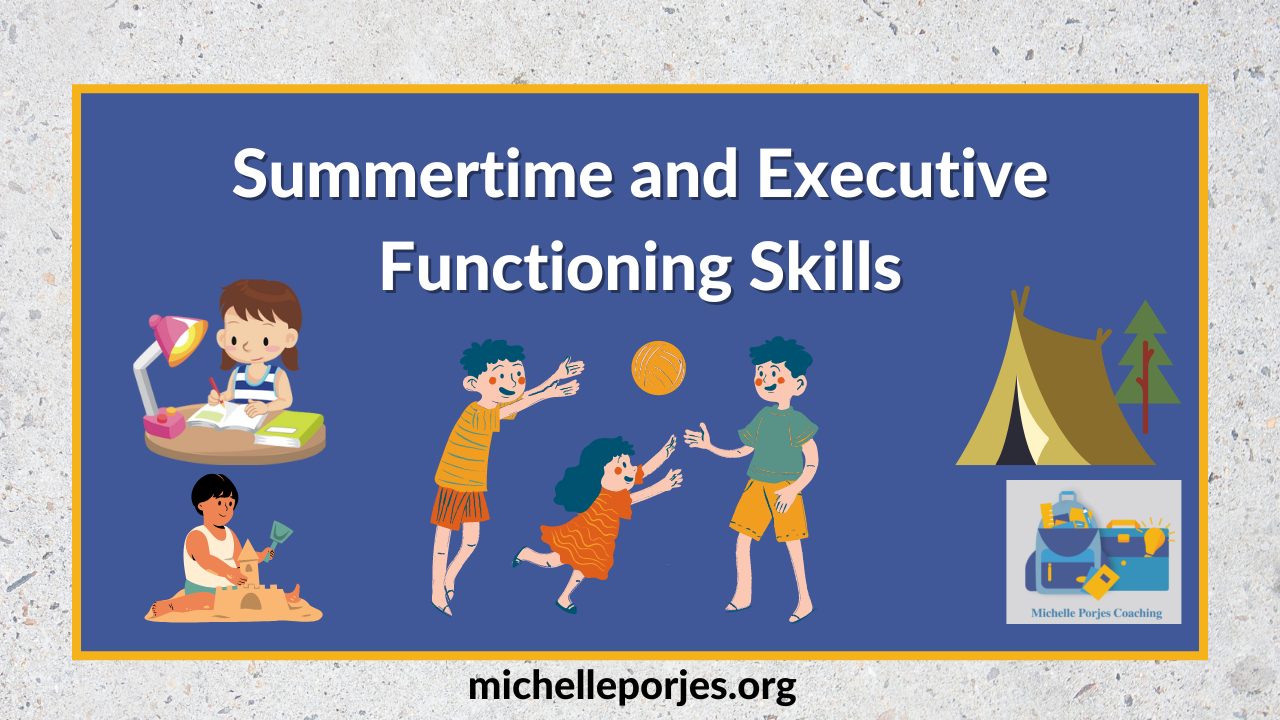Executive Functioning: The managing of time, stuff and information is not only for school time. Summer is an excellent time to stretch and practice executive functioning skills in real-world situations. By making executive functioning skills a part of life, meaningful experiences can be enhanced.. Read on for five ways to grow and/or maintain executive functioning skills over the summer:
- Create a meaningful daily and/or weekly structure. The summer should be different from the school year AND kids do best with some sort of structure. It is fine to include extra downtime, free time and outside time. It is even fine to allow extra screen time. However, it is important for kids to know what each day will look like, how their hours will be filled and when they have activities they have to do and choice time.
A sample schedule might look like this:
Wake up 8:00 AM
Camp 9:00-3:00
Snack and freetime 3:30-5:30
Screen free activities 5:30-6:30
Dinner 6:30-7:00
Reading 7:00-8:00
TV 8:00-9:00
9:00 Bedtime
- Checklists work in the summer too! A checklist is just a written list of 3-5 items to accomplish during a day. Checklists reduce the nag factor and the reliance on memory. Take some time to build the checklist with your child so they feel they have a say in things.
Sample checklists might include the following:
Read 10 pages in a chapter book
Put away clean clothes in drawers
Play outside for 30 minutes
Clear the table and put the dishes in the sink
Write an email to grandma
- Integrate an organizational task into everyday activities. Organizational tasks allow us to “feel” our executive functioning skills at work. It involves physical work and has a beginning, middle and end. We can actually see and experience our accomplishments when we organize.
Sample organizational tasks might include:
Empty the t-shirt drawer onto the bed. Make two piles-one of t-shirts you want to keep and one of t-shirts you want to give away.
Take everything off of the top of the desk and put it on the bed. Make three piles, one of items you want to keep, one of items you want to give away, and one of items that can go in the trash.
- Include intellectual stimulating activities into the summer. experience. The pace of the summer allows children to stretch and grow intellectually in a much different way than during the academic year. With a reduction in school-related stress, children’s minds are open not only to learning new things but being curious and engaging in different ways of thinking.
Sample intellectual activity might include:
Learning about a new country and cooking new recipes
Building a fort or playhouse
Learning about an artist and then visiting an art museum to see the actual art pieces
- Engage real world experiences that build experiences. Two of my all-time favorite activities to recommend for summer are being a part of volunteer opportunities and having a job. These are not as hard as people think but they can require some creative approaches.
Sample volunteer or job experiences might include:
Working in a food pantry or local library
Dog walking
Cleaning out garages
Working as a parent helper with younger children
Wishing all a fulfilling summer!
Curious? What to discuss about your child’s summer in more detail? Reach out to me for a consultation!
